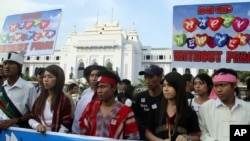The United States and the United Nations are urging the Burmese government to stop its campaign of air strikes against rebels in northern Kachin state, where an escalation in violence is threatening the country's reform process.
State Department spokesperson Victoria Nuland says Washington is "extremely troubled" by the government's use of air power, and is calling for talks that would lead to an end to the fighting.
"We are continuing to urge the Government of Burma and the Kachin Independence Organization to cease this conflict, to get to a real dialogue to address grievances as the Government of Burma has been able to do in virtually all of the other conflict areas," Nuland said.
U.N. Secretary-General Ban Ki-moon on Wednesday called on Burma to refrain from any action that could endanger the lives of civilians or promote further conflict in Kachin state.
A U.N. statement said ongoing hostilities between government forces and rebel fighters from the Kachin Independence Organization have already caused a "large displacement of civilians who continue to be in need of humanitarian assistance."
In an interview earlier Wednesday with VOA's Burmese service, a government spokesperson acknowledged that "training jets" were used in attacks on rebel positions in fighting that began last week. Other officials had at first denied carrying out the strikes.
Myra Dahgaypaw, head of the human rights group U.S. Campaign for Burma, says that President Thein Sein's calls for an end to the fighting are no longer enough. She says the increased fighting brings up real questions about the president's control over the military.
"Burma is not like the U.S., where the commander-in-chief [of the military] and the president are the same person," she said. "Burma has a totally different commander-in-chief who is totally a military person...(and) they will try and protect their power no matter what."
Burma's government and the rebels blame each other for the escalation in violence, which has continued since 2011 after a 17-year-old cease-fire broke down. Tens of thousands have been displaced.
Ethnic groups in the northern part of the country have long accused the government of systematic repression, and have been fighting for greater autonomy in their traditional states.
The Kachin rebel organization is the only major ethnic rebel group that has not reached a cease-fire agreement with the government of President Thein Sein. The president, elected in 2011, has enacted a series of reforms since coming to power.
Western analysts, however, have warned the renewed fighting in Kachin state and ongoing sectarian violence in western Rakhine state threaten to undermine political reform initiatives elsewhere in the country.
State Department spokesperson Victoria Nuland says Washington is "extremely troubled" by the government's use of air power, and is calling for talks that would lead to an end to the fighting.
"We are continuing to urge the Government of Burma and the Kachin Independence Organization to cease this conflict, to get to a real dialogue to address grievances as the Government of Burma has been able to do in virtually all of the other conflict areas," Nuland said.
U.N. Secretary-General Ban Ki-moon on Wednesday called on Burma to refrain from any action that could endanger the lives of civilians or promote further conflict in Kachin state.
A U.N. statement said ongoing hostilities between government forces and rebel fighters from the Kachin Independence Organization have already caused a "large displacement of civilians who continue to be in need of humanitarian assistance."
In an interview earlier Wednesday with VOA's Burmese service, a government spokesperson acknowledged that "training jets" were used in attacks on rebel positions in fighting that began last week. Other officials had at first denied carrying out the strikes.
Myra Dahgaypaw, head of the human rights group U.S. Campaign for Burma, says that President Thein Sein's calls for an end to the fighting are no longer enough. She says the increased fighting brings up real questions about the president's control over the military.
"Burma is not like the U.S., where the commander-in-chief [of the military] and the president are the same person," she said. "Burma has a totally different commander-in-chief who is totally a military person...(and) they will try and protect their power no matter what."
Burma's government and the rebels blame each other for the escalation in violence, which has continued since 2011 after a 17-year-old cease-fire broke down. Tens of thousands have been displaced.
Ethnic groups in the northern part of the country have long accused the government of systematic repression, and have been fighting for greater autonomy in their traditional states.
The Kachin rebel organization is the only major ethnic rebel group that has not reached a cease-fire agreement with the government of President Thein Sein. The president, elected in 2011, has enacted a series of reforms since coming to power.
Western analysts, however, have warned the renewed fighting in Kachin state and ongoing sectarian violence in western Rakhine state threaten to undermine political reform initiatives elsewhere in the country.











